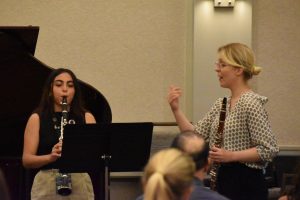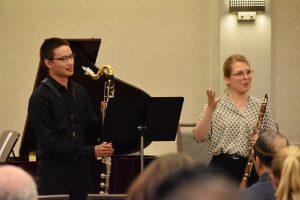
ClarinetFest® 2023 in Review
ClarinetFest® 2023 Day 4
Masterclass with Ecesu Sertesen
by Season Cowley

Turkish clarinetist Ecesu Sertesen led a masterclass on Saturday, July 8th at 10:45 A.M. at The Westin Westminster hotel. The students invited to participate in this masterclass included Jessica Schaller, Valeria Ramírez Arias, and Henry McNamara. The overarching topics of this masterclass included playing without tension, proper use of air, and phrasing.
Sertesen welcomed Jessica Schaller, a sophomore at the Crane School of Music, to begin the masterclass. Jessica performed the opening two sections of Lefebvre’s Fantasie Caprice. During Eccesu’s work with Jessica, her primary focus was on improving her ease of playing. She first asked Jessica to widen her horn angle, which immediately improved the resonance of her sound, and asked her to breathe less frequently and with an “o” vowel sound so that she could take a deeper, more relaxed breath. They also discussed practice techniques to improve fluidity in technical passages, including varying articulation patterns and rhythms. After playing through these types of variations, Jessica was able to play the technical passage they’d worked on with more musical direction and precision. Continuing into the third, slower section of the piece, Sertesen encouraged Jessica to play with more air and a more natural-feeling embouchure that does not constrict the reed’s vibrations.
Next up was Valeria Ramírez Arias with the exposition of the first movement of Mozart’s Clarinet Concerto, K. 622. Sertesen worked on phrasing and musical direction with Valeria in the first two themes of the exposition. They discussed where the phrases begin and end, and not allowing the air to stop so frequently and interrupt the direction of the phrase. At the end of the first theme, Sertesen discussed counting the exact number of shakes for the trill for the sake of consistency. She also recommended playing through JeanJean’s Vade Mecum daily to work on finger control for this. In the second theme, she asked Valeria to breathe more deeply with an “o” vowel sound and to play with more presence; she explained that while it is piano, she still needs to play loudly enough to be heard over the orchestra.

Henry McNamara, an undergraduate student at Arizona State University, wrapped up the masterclass with a performance of Neurodivergent for bass clarinet and fixed electronics by Sarah Lucas-Page. As Sertesen worked with Henry on phrasing, she was able to ask the composer questions as they worked through the piece. She immediately asked Henry if he could switch from his harness to a standing peg, as it was impeding his ability to play with proper hand position. The opening of the piece is for clarinet alone, and they discussed taking more time and playing with more dynamic contrast to bring the music to life. As they ventured into a more technical section of the piece, Sertesen mentioned moving less so that his finger action could be improved. When starting a note in the altissimo, she asked Henry to hear the note before playing to improve pitch stability.
Overall, the masterclass was informative and Sertesen’s teaching was deliberate and thoughtful. One aside that was particularly insightful was a discussion about the importance of knowing oneself. She said that “discovering yourself is the first important goal” so that you can take the advice of your mentors in a way that works best for you.
Comments are closed.